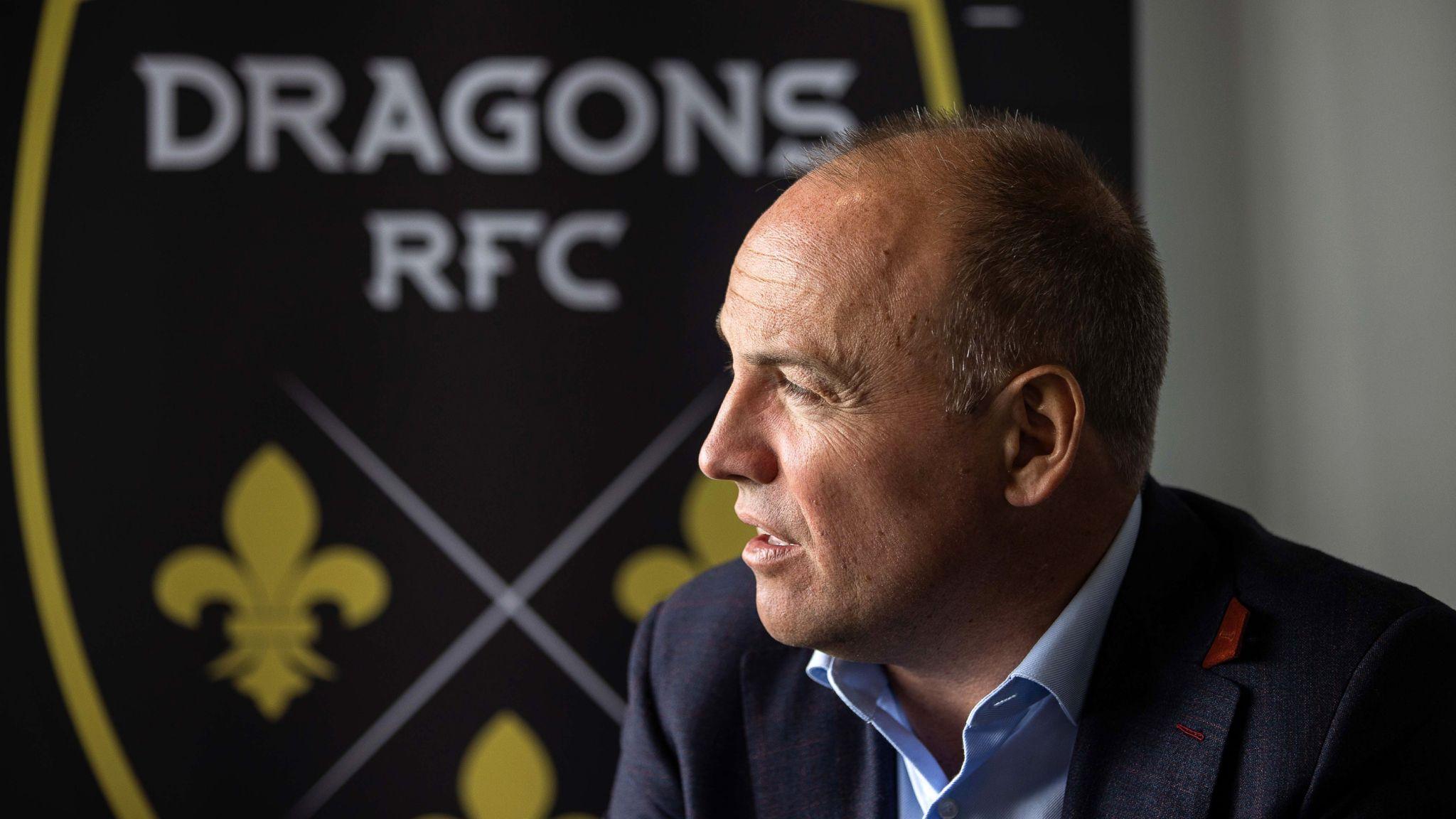Dragons came close to closure in 2023 - Buttress

David Buttress will remain as a non-executive director when he steps down as Dragons chair this summer
- Published
Co-owner David Buttress has said Welsh regional side Dragons came close to extinction in the summer of 2023.
Buttress, who is stepping down as chairman this summer after seven years at the region's helm, has also called for more investment in Welsh professional rugby.
The 48-year-old businessman helped take the club back into private ownership from Welsh Rugby Union (WRU) control last September but admits the Newport-based team almost folded.
"There’s no denying that," he told BBC Radio Wales.
"Last summer I went to bed on a Tuesday night and thought the deal was off and the club was gone, and professional rugby in Gwent was looking pretty precarious.
"But I managed to ping an email off in the early hours of that Tuesday morning to the WRU with some counter-proposals which managed to reignite discussions and close the gap a bit.
"We were preparing for telling the players and the staff on the Thursday, so it was definitely pretty hairy at one point. That’s all in the past now... but there’s no denying it was pretty close.”
Dragons lock Carter banned for three games after red card
- Published1 May 2024
Tonga forward Funaki to join Dragons
- Published29 April 2024
Dragons out of WRU control after takeover deal
- Published30 June 2023
Formed as Newport Gwent Dragons as part of Welsh top-tier rugby's transition from a club to regional structure 20 years ago, financial difficulties saw the WRU step in during the summer of 2017.
The governing body increased its 50% share in a takeover that included the nine-acre Rodney Parade site and saw the team rebranded simply as 'Dragons'.
A return to private ownership was then a condition of a new six-year deal signed between all four regions - including Cardiff, Ospreys and Scarlets - and the WRU in March 2023.
Former Just Eat entrepreneur Buttress headed a consortium along with American biotech tycoon Hoyoung Huh and former Pontypool scrum-half David Wright, who is to take over as the region's next chair in July.
Buttress - who will remain on the Dragons board while taking over as CEO of energy company Ovo - says while the future is now secure, challenges remain.
"It’s in very loving, caring hands now and we’ll make sure it stays stable and Gwent rugby at a professional level will be fine," he said on the Radio Wales Breakfast programme.
"I think the bigger question is how do we make it successful, because Welsh rugby is investing less now in the professional game than when I started in 2017. So it’s not a surprise to me when I see the Six Nations [where Wales finished with the Wooden Spoon] or when I see our regions struggling in the league.
"It’s not a secret, if you invest less and less you’re not going to grow.
"We really do have to prioritise and invest in the professional game so it can grow again and be what we know it is and could be."

Rodney Parade hosts matches for Dragons and League Two football club Newport County as well as some games for Newport RFC
Budgets for the four Welsh regions were cut to £5.2m for the 2023-24 season which has seen generally disappointing performances in Europe and the United Rugby Championship [URC].
Those budgets will be reduced further to £4.5m next season as the game in Wales looks to find a sound financial footing.
Meanwhile, Abi Tierney, who was appointed as the WRU's chief executive officer last summer, has promised to deliver a new strategic plan for Welsh rugby in June.
And Buttress believes the key to success is not just financial.
"Yes we need to invest more, there’s no denying that," said Buttress.
"I think we are being out-invested by all our competitors and ultimately that leads to a competitive advantage on the field, but I think it is more than that.
"It’s also working together more closely off the field in terms of coaching, training facilities so we make those to a standard that is suitable for the modern professional game. And I think thirdly it’s creating a culture around Welsh rugby where we all work together to bring in sponsors, supporters off the field.
"So I think it’s not just money, I think it’s all three of those things and I’m sure Abi, who’s obviously been very successful, will look at all three of those things and [will be] looking to put them all in place over the coming months and years or so."